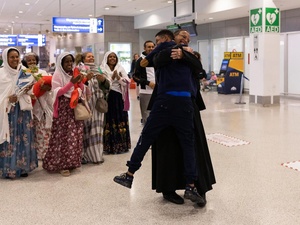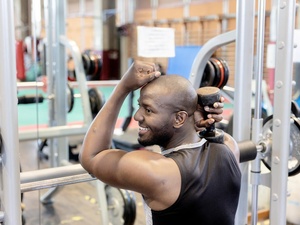Afghans deported from France despite UNHCR progress at Sangatte
Afghans deported from France despite UNHCR progress at Sangatte

UNHCR's systematic in-depth registration process at the Sangatte reception centre could be completed by early January.
CALAIS, France, November 29 (UNHCR) - The UN refugee agency has expressed concerns over the deportation of eight Afghan asylum seekers from France. In a separate development, it has reported that the registration of people at Sangatte reception centre is going smoothly and could be completed by early January.
UNHCR today confirmed that the eight Afghans were forcibly deported from France back to Afghanistan on Wednesday. They were part of a group of 15 who were apprehended near Metz in north-eastern France, and were put through an accelerated asylum procedure. Under this procedure, if they lodge an appeal, they can still be deported back to their home country before the appeal is heard.
This is the first time this has happened in France since a tripartite agreement was signed between the governments of France and Afghanistan and UNHCR on September 28. The refugee agency has expressed fears that this may mark a breach of the spirit of that agreement, which placed the focus on voluntary returns at least until end of the winter.
The same emphasis on concentrating initially on voluntary returns, and only later (providing the situation in Afghanistan is suitable) possibly moving on to involuntary returns for rejected Afghan asylum seekers, underpins the tripartite agreement signed with the British government in October, and also the EU agreement on Afghan returns reached on Thursday in Brussels.
UNHCR also said it was concerned that using an accelerated procedure, which allows people to be expelled to their home country before their appeal is heard, is not suitable for asylum-seekers generally - and especially when they come from a country as complex, fragile and unsettled as Afghanistan.
Under the tripartite agreement with France, 15 Afghans have so far gone home voluntarily. Twelve of them were from the Sangatte reception centre near Calais, where UNHCR is reporting progress in its interviewing and registration process.
As of the end of the day Thursday, the seven UNHCR interviewing teams operating there had conducted detailed interviews with 577 individuals - around one-third of the total. Boosted by the arrival of two more Kurdish-speaking team members, the systematic in-depth registration process should be completed by the beginning of January.
The population of the centre stands at 1,789 people with valid badges, and seems to have more or less stabilised. People who disappear from the centre for a period of more than 72 hours lose their badge, and with it the right to remain in the centre.
After an initial period of uncertainty following the closure of Sangatte to newcomers on November 5, the centre's inhabitants are being extremely co-operative and show no reluctance to be interviewed. For the most part, they are very keen to tell their stories.
One trend that has emerged during the confidential interviews is that quite a few people seem to have been displaced within their own countries prior to deciding to leave altogether. Many of these seem to be in a very weakened and traumatised condition.
Vulnerable cases, including unaccompanied minors, widows and disabled people, are still being discovered during the interview process. In the case of all unaccompanied minors, and some other vulnerable cases - including all those who request asylum in France - UNHCR has asked the French authorities to provide more suitable alternative accommodation.
In addition, the UNHCR teams have so far identified 61 possible family reunification cases, which have been referred to our offices in other European countries and are being discussed with the governments there.








